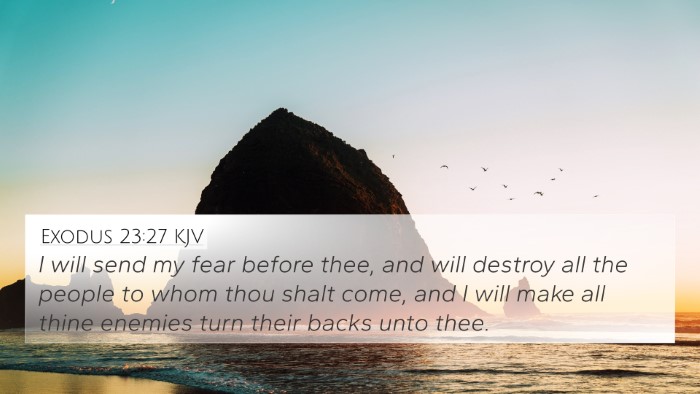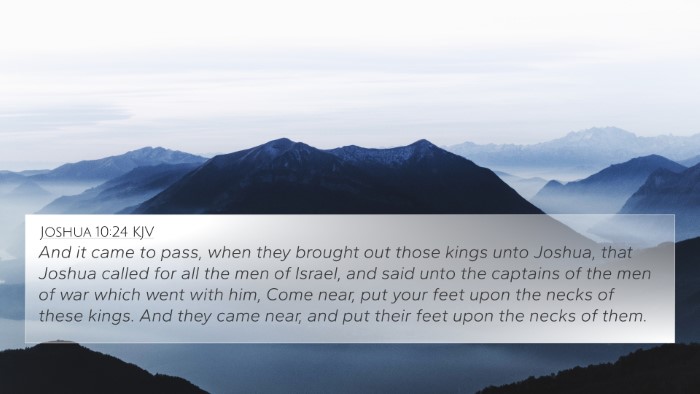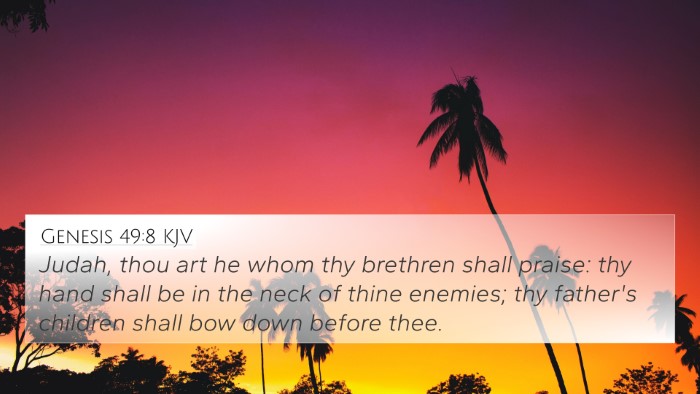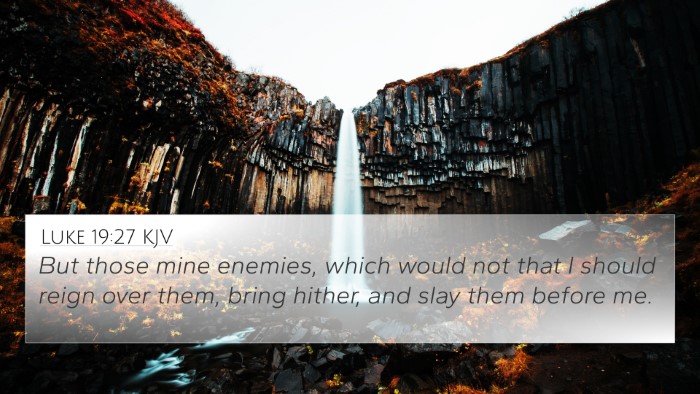Understanding 2 Samuel 22:41
2 Samuel 22:41 states:
"And thou hast also given me the necks of mine enemies, that I might destroy them that hate me."
Verse Meaning and Analysis
This verse encapsulates a moment of triumph for King David as he reflects on God's protection and aid in overcoming adversaries. David acknowledges that the victory over his enemies is a divine gift, symbolizing not just military success but also spiritual deliverance. The enemies mentioned are not merely physical foes but represent sin and opposition to God's will.
Insights from Commentaries
-
Matthew Henry:
Henry notes that David recognizes God's hand in his victories. The 'necks of mine enemies' signifies complete subjugation, implying an overwhelming defeat. This reflects not only on David’s military exploits but also on the broader theme of God's providence in the lives of His chosen.
-
Albert Barnes:
Barnes emphasizes the metaphorical use of 'necks' to illustrate total defeat. He highlights that this acknowledgment of God's intervention is rooted in David's gratefulness, indicating that the victories are a testament to God's faithfulness.
-
Adam Clarke:
Clarke suggests that this verse can be interpreted as prophetic, implying that David’s enemies symbolize future challenges faced by the followers of God. The act of destruction described represents the ultimate victory of good over evil, aligning with Christian themes of salvation and deliverance.
Cross-References and Thematic Connections
To enhance your understanding, here are notable Bible verse cross-references related to 2 Samuel 22:41:
- Psalms 18:40: "Thou hast also given me the necks of mine enemies; that I might destroy them that hate me." - This psalm directly parallels 2 Samuel 22.
- Romans 16:20: "And the God of peace shall bruise Satan under your feet shortly." - A symbol of victory over the enemy.
- 1 Corinthians 15:25: "For he must reign, till he hath put all enemies under his feet." - Discussing Christ's ultimate victory over foes.
- Ephesians 6:12: "For we wrestle not against flesh and blood, but against principalities, against powers..." - Highlights the spiritual warfare referenced in David's proclamation.
- Colossians 2:15: "And having spoiled principalities and powers, he made a shew of them openly, triumphing over them in it." - Shows Christ's triumph over spiritual enemies.
- Hebrews 10:13: "From henceforth expecting till his enemies be made his footstool." - Continuity of the theme of victory.
- Psalm 110:1: "The Lord said unto my Lord, Sit thou at my right hand, until I make thine enemies thy footstool." - Another messianic reference to victory over enemies.
Bible Cross-Referencing Techniques
Utilizing cross-references enhances one's study of scriptures, allowing for deeper connections and a comprehensive understanding. Here are some tools for Bible cross-referencing:
- Utilizing a Bible concordance to find related verses.
- Employing a Bible cross-reference guide to see connections between scriptures.
- Engaging in cross-reference Bible study for thematic analysis.
- Learning how to use Bible cross-references can reveal insights into interconnected teachings.
Concluding Thoughts
The insights gleaned from 2 Samuel 22:41, combined with its cross-references, illuminate the broader themes of divine protection, victory over evil, and a faithful God's assistance in times of trouble. In studying these verses, one not only understands David’s personal journey but also the overarching narrative of God’s redemptive work through history. The connections between biblical texts, such as those found in the Psalms and New Testament, reinforce the unity and coherence of scripture.
By actively engaging in comprehensive Bible cross-reference materials, readers can enrich their understanding and create a well-rounded approach to studying the complexities of scriptural narratives.










